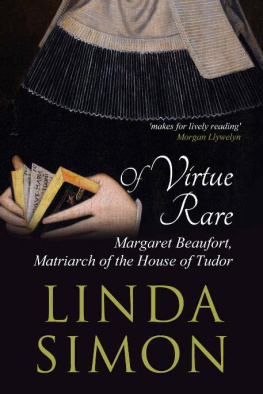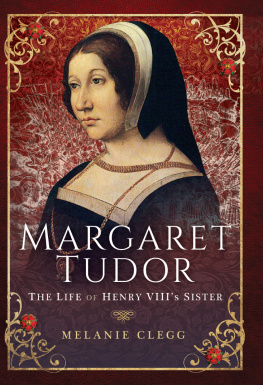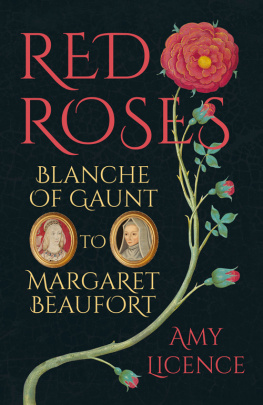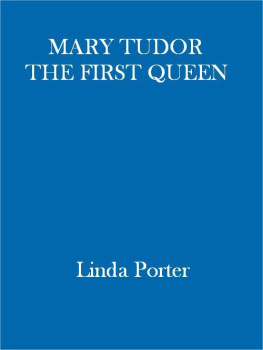Linda Simon - Of virtue rare: Margaret Beaufort, matriarch of the House of Tudor
Here you can read online Linda Simon - Of virtue rare: Margaret Beaufort, matriarch of the House of Tudor full text of the book (entire story) in english for free. Download pdf and epub, get meaning, cover and reviews about this ebook. year: 2016, publisher: Endeavour Media, genre: Non-fiction. Description of the work, (preface) as well as reviews are available. Best literature library LitArk.com created for fans of good reading and offers a wide selection of genres:
Romance novel
Science fiction
Adventure
Detective
Science
History
Home and family
Prose
Art
Politics
Computer
Non-fiction
Religion
Business
Children
Humor
Choose a favorite category and find really read worthwhile books. Enjoy immersion in the world of imagination, feel the emotions of the characters or learn something new for yourself, make an fascinating discovery.
- Book:Of virtue rare: Margaret Beaufort, matriarch of the House of Tudor
- Author:
- Publisher:Endeavour Media
- Genre:
- Year:2016
- Rating:3 / 5
- Favourites:Add to favourites
- Your mark:
- 60
- 1
- 2
- 3
- 4
- 5
Of virtue rare: Margaret Beaufort, matriarch of the House of Tudor: summary, description and annotation
We offer to read an annotation, description, summary or preface (depends on what the author of the book "Of virtue rare: Margaret Beaufort, matriarch of the House of Tudor" wrote himself). If you haven't found the necessary information about the book — write in the comments, we will try to find it.
Of virtue rare: Margaret Beaufort, matriarch of the House of Tudor — read online for free the complete book (whole text) full work
Below is the text of the book, divided by pages. System saving the place of the last page read, allows you to conveniently read the book "Of virtue rare: Margaret Beaufort, matriarch of the House of Tudor" online for free, without having to search again every time where you left off. Put a bookmark, and you can go to the page where you finished reading at any time.
Font size:
Interval:
Bookmark:
OF VIRTUE RARE
Margeret Beaufort, Matriarch of the House of Tudor
Linda Simon
Linda Simon, 1982
Linda Simon has asserted her rights under the Copyright, Design and Patents Act, 1988, to be identified as the author of this work.
First published in 1982 Houghton Mifflin Company.
This edition published in 2018 by Endeavour Media Ltd.
For Anita McClellan
Table of Contents
I - The Heiress
IN BEDFORDSHIRE, on the last day of May 1441, a daughter was born to the great-great-grandson of Edward III, John Beaufort, and his wife, Margaret Beauchamp. The child was named for her mother and her paternal grandmother, and the event was delicately inscribed in the familys illuminated Book of Hours.
The infant girl was an heiress of both her parents fortunes. Margaret Beauchamp had been the widow of a knight when she married Beaufort, and her husbands estates augmented the considerable holdings she already had inherited from her father. John Beaufort had claimed his title of earl of Somerset and with it large estates and important responsibility. He was treated well by the present king, Henry VI, and given positions appropriate to his rank. For years, he had served England in the seemingly endless Hundred Years War with France. Though his record as a soldier was not startling he had been taken prisoner in 1421 the king, in 1443, made him captain general in two strategic areas of France, Aquitaine and Normandy, then still under English control.
For the first two years of her life, Margaret lived at her mothers ancestral home at Bletsoe, Bedfordshire, some sixty miles north of London, with both parents and a constellation of servants making up her small world. As an infant, she was swaddled, each limb wrapped separately in bandages of wool strips about two inches wide. Larger bandages enwrapped her whole body, from toes to neck, in an effort to ensure that her limbs would grow straight and sturdy. She was rocked to sleep in a hand-hewn wooden cradle, suckled for brief periods at frequent intervals to prevent her from gorging herself, bathed carefully and rubbed with oil of almonds or acorns, and, as their only child, was treated tenderly by her parents.
Dark-haired, pale, thin, and somewhat frail, Margaret was bright and alert, with an intelligence evident from the first. With few companions other than the children of visiting nobility, she learned to amuse herself, depend on her own resources, and ask little from those around her. Her world at Bletsoe was comfortable and secure; holidays relieved the tedious routine at the manor, and occasional feasts replaced the usual dinner at midday. When her father traveled to London she shared in the pleasure of the minstrels who joined the entourage to brighten the long and dull medieval journey, fascinated as much by their bright array as by the joyful airs that seemed to linger long after the retinue had disappeared from her sight.
But in April 1443 she saw her father leave on a journey that would last more than just a week or a month. He was going to take his position in France, and one could only guess when he might return. Not understanding the reasons for his departure, the small girl watched as servants gathered his clothing and personal possessions into numerous parcels. He was not there to celebrate her second birthday. By her third birthday, he was dead.
It was only later, long after she had grown from a woman-child into a woman, that Margaret was able to piece together the circumstances of her fathers death. Even then, she never knew the truth, for as the years passed, truth and rumor intermingled with myth. Only one thing was sure: John Beaufort was a victim not of battle, but of the pervasive sensibility of war.
He had landed at Cherbourg with some seven thousand troops and began to march through Maine and into Brittany. But his command wavered. He was an arrogant general, refusing to divulge his strategy to his captains. I will reveal my secret to no one, he told them. If my shirt knew my secret I would burn it. His captains believed that his secret did not exist and that their leader was marching to defeat. He managed to seize one town in Brittany, then returned it for a large cash payment. No one understood that escapade: he was left with neither the town nor the promise of neutrality, which many considered vital in Brittany.
By the following year he returned to England, having made no advances in France. Among the commoners and much of nobility there was a great sense of frustration that one hundred years of war might come to loss for England. Though the king himself, and a small party of supporters, wanted peace more than the crown of France, that peace party was clearly the minority. Most Englishmen could not believe in the increasing strength of French nationalism and the weakness in morale, in leadership, in physical endurance of the English soldiers. Victorious leaders were hailed when they returned to London, but any who lost battles and conceded defeat in cities and towns were severely derided.
By the time John Beaufort returned, he found that his reputation had preceded him. He was mocked by his peers and banished from court. Disgraced, he died on May 27, 1444, a probable suicide. At least one poet saw in John Beaufort an example of the Mutability of Wordly Changes and commemorated him in verse:
The noble duke of somersett, John,
whome all brytayne and also normandye
hadde In grett drede (& his enemyes everichon)
for in his manhode, puissance, & chevalrye,
when he was weddyd & In estate most hye
In the best age (right as hys fortune was)
The bull to gronde hym cast cruellye,
that after soone he dyed: suche was hys grace .
Later, even his daughter could find no evidence of a papal bull that dishonored him, yet rumors circulated that the pope, too, was disgusted with Beauforts poor service to the king.
Beauforts death was never spoken of as suicide. At Bletsoe, where his family continued to reside, those who visited the grieving widow alluded only to the strain under which he had worked in France, the weakness of his health before he returned, the epidemics of dysentery and other debilitating illnesses that often swept through the troops. To his family, he died a hero.
John Beaufort left estates in Lincoln, Worcester, Kent, Southampton, Middlesex, Norfolk, Essex, Somerset, Lancaster, Westmoreland, York, Gloucester, Sussex, and Stafford. Though some lands had been bequeathed to his brother, most of his possessions ensured the financial independence of his widow and daughter.
Margaret was raised at Bletsoe under her mothers guidance and given an unusual education for a female at the time. She was taught the obligatory skill of needlework as well as reading, writing, and French. Her tutors remarked on her excellent memory and the speed at which she was able to assimilate material and advance in her studies. She wanted to learn Greek and Latin, languages reserved for men who would one day join the clergy, but her request was refused. Her mother would not engage a tutor for such esoteric studies. Margaret had no choice but to obey. Years later, she admitted her regret that both languages had been denied to her. She could translate works from French, but it seemed to her that the greatest works were hidden from her in tongues she could not understand.
With no one to share her nursery and then her schoolroom, Margaret withdrew into a world of studies and books. She enjoyed solitude, and her most fulfilling moments were those devoted to scholarship or to religion. Like all young noblewomen of the time, she was duly instructed in the teachings of the church, but unlike most of them, she approached the teachings with an inquiring and receptive mind. Instead of docilely memorizing Christian doctrine, she sought to make it her own and to live by it. Her prayers were not mindless recitations, but fervent communications with a deity in whom she firmly believed and completely trusted. Quiet, introspective, she watched as visitors from the cities and the court came and went at Bletsoe, listened as servants gossiped about a world they could not comprehend, and came to her own conclusions.
Next pageFont size:
Interval:
Bookmark:
Similar books «Of virtue rare: Margaret Beaufort, matriarch of the House of Tudor»
Look at similar books to Of virtue rare: Margaret Beaufort, matriarch of the House of Tudor. We have selected literature similar in name and meaning in the hope of providing readers with more options to find new, interesting, not yet read works.
Discussion, reviews of the book Of virtue rare: Margaret Beaufort, matriarch of the House of Tudor and just readers' own opinions. Leave your comments, write what you think about the work, its meaning or the main characters. Specify what exactly you liked and what you didn't like, and why you think so.










